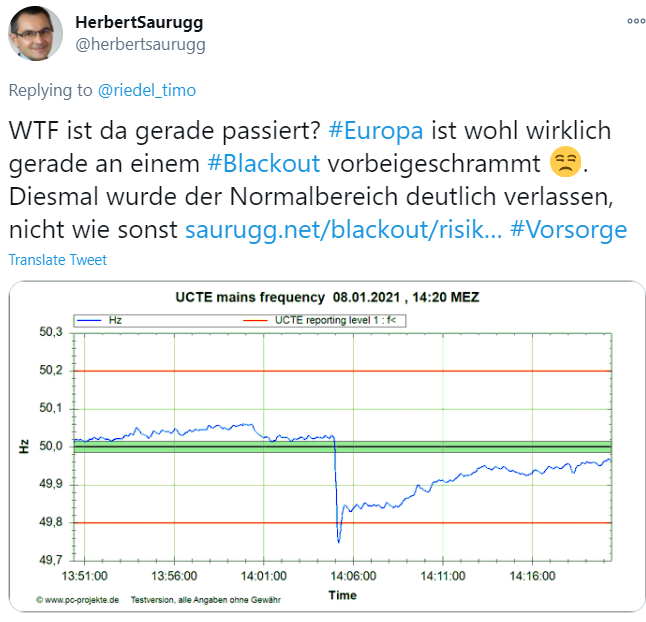Last Friday, January 8, 2021, Europe narrowly escaped a blackout, says power grid expert
A European power grid disturbance occurred at around 2 p.m. according to the Austrian Power Grid (APG). The normal frequency for Europe is 50 Hz and on Friday afternoon it dropped sharply to 49.75 Hz.
“A larger supply area must have broken away,” blackout expert Herbert Saurugg told futurezone.
Saurugg tweeted:
“WTF just happened there? #Europe must have really just scraped past a #blackout. This time the normal range was clearly left, not as usual” (Image cropped from Twitter)
“According to Saurugg, who has been involved in crisis management for years, this is the second most serious incident since the blackout in Europe in 2006, when the shutdown of two high-voltage lines in Germany led to a drop in frequency. As a result, power failed in several European countries. Fortunately, this did not happen on Friday, but it was close.” reported futurezone.
Saurugg added: “Normally, the European power grid is synchronized to compensate for possible fluctuations. If the frequency drops too low, this synchronization will be automatically interrupted. A so-called temporary grid splitting occurs, in which the interconnected grid is divided.”
Saurugg also said a similar incident in Europe took place on January 10, 2019.
The cause of the latest disturbance is still under investigation but officials believe it may have occurred in south-eastern Europe.






Hope someone with knowledge will comment.
That drop appears to be just past half-way to a serious event.
??? (0.5 Hz on a 50 Hz or 60 Hz network)
{above found on internet – so it must be right}
We had a close call in the UK about a year ago, when storms caused a large windfarm to trip, followed by a conventional power station. This left the grid with no spare capacity, and several areas had to be dumped to avoid a complete grid failure. Afterwards I did some reading, and it seems that it’s not just the actual frequency which matters, but the rate of change. In other words, a relatively large but slow variation is less crucial than a smaller but more rapid one. Makes sense – the latter is more indicative of generators suddenly going off line, which can very quickly (in fractions of a second) lead to a cascade failure. One of the recommendations from the subsequent enquiry was for the calibration of the protection trips to be altered to give better “Ride Through” capabilities. This is from memory (quite late at night!) but I’m sure I have the documents somewhere on my computer…
Indeed it did. I have a report that it caused blackout in NW Romania and neighbouring countries.
https://www.agerpres.ro/english/2021/01/08/commission-of-european-experts-to-investigate-power-grid-incident-that-left-northwest-romania-without-electricity–640149
[…] We recently reported on this here. […]
[…] We recently reported on this here. […]
[…] We recently reported on this here. […]
[…] Germany’s rickety and moody power grid now threatens the entire European power grid stability, as we recently witnessed. […]
[…] Germany’s rickety and moody power grid now threatens the entire European power grid stability, as we recently witnessed. […]
[…] Germany’s rickety and moody power grid now threatens the entire European power grid stability, as we recently witnessed. […]
Earth lasers’ plasma shield CAN prevent a devastating global blackout/all nuclear plants’ blasting by asteroid explosion (as in Tunguska-1908 & Chelyabinsk-2013) or solar storm hit! 9 times near-miss extinction so far: 1972, 1989, 2003, 2006, 2012, 2017, 2019, 2020, 2021 https://GlobalBlackoutPrevention.wordpress.com
Interesting. Thanks.
Here’s something related that I found searching for that.
https://phys.org/news/2020-11-apophis-asteroid-earth-thought.html
On the lighter side…
https://www.dailymotion.com/video/xmh15e
[…] Germany’s rickety and moody power grid now threatens the entire European power grid stability, as we recently witnessed. […]
[…] La desvencijada y caprichosa red eléctrica de Alemania amenaza ahora toda la estabilidad de la red eléctrica europea, como vimos recientemente . […]